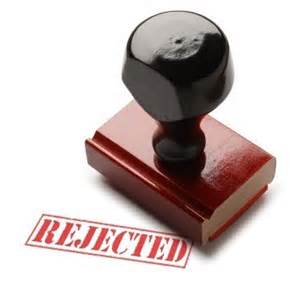No. Thanks, but no thanks. Decline.
Not interested. Dismissed. Rejected.
Your idea might not be adopted. Your application might be declined. Your declaration of love might receive a blank look. It’s ok to not like rejection. But, if you avoid it when something really matters to you, I promise you’ll regret it.
Why? Because, every rejection tells you what you need to know to get better about what matters to you.
|
Every rejection is a gift. Every rejection is an opportunity to figure out how to bounce, not break. Seth Godin (PS: There really is a store called “The Reject Shop“!) |
 |
But, “what if”
In coaching conversations too numerous to count, people say “I’m afraid, because what if …?”
- I’m afraid to apply for the job, what if they don’t hire me?
- I’m afraid to ask for a raise, what if they don’t give it to me?
- I’m afraid to talk to my (fill in the blank) about (fill in the blank), what if he/she gets mad at me?
Paradox: The very thing that the person wants to accomplish is at risk by avoiding the conversation that could result in the imagined fear, the “what if”, coming true. Not applying for a job or a asking for a raise pretty much guarantees neither will be offered. Not bringing up a potentially contentious issue in order to “try and save” a relationship erodes it anyway.
If you are afraid of getting a “no”, you won’t ever get a “yes”. A rejection lets you know where you stand (at least with that audience) and, from there, figure out what to do next.
Rejection is essential for development, both personal and professional. If we don’t know where the edge of our current competency lies, we can’t extend it.
Mine the rejection for gold
Here are some comments from women in an online discussion: Is rejection necessary for professional success? How do you own rejection in your professional life?
- Rejection is needed so I do not waste time. When something I propose or an action I take gets rejected, I mentally move on. A fundamental part of competing for anything is the risk of losing. Sometimes even the best lose out due to things beyond our control.
- Having the experience of being rejected gives me a better sense of empathy for others in that position when I am in the position as the rejecter.
- Rejection can be used to redirect/refocus us. Rejection can cause us to do a self-examination so that we can become better, do better..
- The absence of failure dilutes the appreciation of successes as well as the knowledge and appreciation of humility, character and a greater understanding of an individual’s self-worth.
- Whether a rave or a rejection, it is 1, count it, 1 point of view.
This last point is worth repeating: A rejection is 1 point of view. It’s not the only one you’ll ever get, just like 1 rave is not the last one you’ll get.
Make the rejection pay off
 When someone says “No” to your idea or offer:
When someone says “No” to your idea or offer:
- Recognize that your idea was rejected, not you. (I know it feels like you are being rejected. You’re more than this 1 idea or offer, aren’t you?)
- Make sure your inner critic doesn’t pile on. The ever-present inner critic eagerly berates us – I knew I shouldn’t have asked. That was a stupid thing to say. They don’t like me and they never will listen to my ideas. Why do I even try? – and slings mud at the person saying no as well: They’re too stupid to understand your ideas. Their egos are too big. They’ll never agree with you because you’re not in the club. Why bother? And we don’t. Score 100 for the inner critic, 0 for you.
- Ask for clarification about their rejection. (Were there parts of my idea that could work? What would I need to change to make you consider what I proposed? Is there something I’m not aware of that had you reject it?)
- Thank them for their feedback and regroup.
By seeking to understand their perspective, you can build trust in the relationship even when your idea is declined. Talk about making the rejection work for you!
Avoiding rejection guarantees you a safe (__ fill in the blank __ ) – one devoid of huge disappointments, crushed dreams and hurt feelings and one devoid of outrageous accomplishments and extraordinary relationships.
Allard Lowenstein, political activist, said: The question should be, “Is it worth trying to do? Not, “Can it be done?”
It’s our pursuit of what matters to us that encourages us to take rejection as a stepping stone forward, not a sign to give up.
Subscribe
Get Camille's latest posts!

You share interesting things here. I think that your blog can go viral easily…